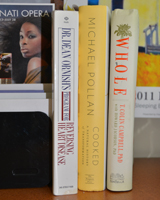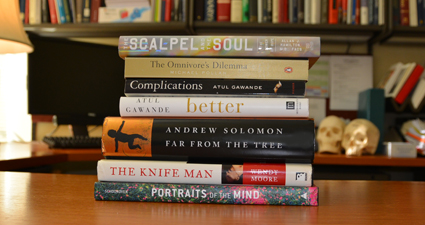Research shows that vacations are good for your health! Your heart will thank you for getting away from work and its accompanying stresses. For many people, one of the most enjoyable parts of a vacation is indulging in a good book. If you haven’t read a book yet this summer and you’re not sure where to start, here are recommendations from specialists and associates at the UC Neuroscience Institute, one of four institutes of the UC College of Medicine and UC Health. Some are related to neuroscience and education, while others are not. All have value in their ability to inspire or enlighten.
Joseph Broderick, MD, Research Director, UC Neuroscience Institute, and Albert Barnes Voorheis Professor & Chair, UC Department of Neurology
- Unbroken, by Laura Hillenbrand. “A great and compelling real-life story of a true World War II hero.”
- Thinking, Fast and Slow, by Daniel Kahneman. “This is the best book about how and why we make decisions in our daily life by a Nobel Prize winner in behavioral economics. I paraphrase my experience of this book as ‘Reading slow and thinking deep.’ ”
 John M. Tew, Jr., MD, Clinical Director, UC Neuroscience Institute, and Professor of Neurosurgery, Radiology & Surgery
John M. Tew, Jr., MD, Clinical Director, UC Neuroscience Institute, and Professor of Neurosurgery, Radiology & Surgery
- Whole: Rethinking the Science of Nutrition, by T. Colin Campbell. “Whole is the successor to The China Study (by T. Colin Campbell and Thomas M. Campbell II). “Both books are rather complex and require a deep appreciation for the theory of why there is such resistance to the plant nutrition concept. Whole provides the insight into the industrial-business resistance to the life-changing opportunity that plant-based nutrition can provide.”
- Fat Chance: Beating the Odds Against Sugar, Processed Food, Obesity, and Disease, by Robert H. Lustig. “This is another good summer read. Most people should be familiar with the publications of Dean Ornish, whose work is readable and transformative.”
 Michael Privitera, MD, Medical Director of the UC Epilepsy Center and Professor of Epilepsy
Michael Privitera, MD, Medical Director of the UC Epilepsy Center and Professor of Epilepsy
- Another thumbs up for Thinking, Fast and Slow, by Daniel Kahneman. “This is my choice for summer reading for the academic neuroscientist. This is a very readable book that uses psychological research to show us how we think and make decisions, most of the time without realizing it. His insights on undetected biases are interesting and helpful when understanding decisions that range from personal to professional. His simplified construct of System 1 and System 2 is appealing, although I believe there is much more complexity in the brain and mind.”
Henry Nasrallah, MD, Professor of Psychiatry and Behavioral Neuroscience and Director of the Schizophrenia Program at UC
- In Search of Memory: The Emergence of a New Science of Mind, by Eric R. Kandel, MD, Nobel Prize Laureate in Medicine in 2000. “This is a wonderful and inspiring autobiographical book by one of the premier neuroscientists of our time. It is full of insights about life and clues of what it takes to achieve greatness. I invited Professor Kandel to deliver a special lecture last October and, for the first time in years, it was a full-house, including the balcony.”
Ravi Samy, MD, Associate Professor of Otolaryngology and Director of the Adult Cochlear Implant Program at UCNI
- On the Mend: Revolutionizing Healthcare to Save Lives and Transform the Industry, by John Toussaint, MD, et. al. “This is a great book on lean / kaizen principles to improve the quality of healthcare while reducing costs.”
Rekha Chaudhary, MD, Assistant Professor of Medicine and Neuro-Oncologist at UC Brain Tumor Center:
- The Alchemist, by an allegorical novel by Paulo Coelho, first published in 1988 and translated into more than 50 languages. “This is an inspirational book for any new journey.”
Cal Adler, MD, Associate Professor of Psychiatry & Behavioral Neuroscience and Co-Director of the Mood Disorders Center at UCNI
- Darkness Visible: A Memoir of Madness, by William Styron. The book grew out of a lecture given at the Department of Psychiatry at Johns Hopkins University School of Medicine. “It is an insightful description of the author’s depression, even if it’s not entirely complimentary toward psychiatrists.”
Keith Herrell, Public Information Officer for UC Department of Neurology and Rehabilitation Medicine and the Department of Psychiatry and Behavioral Neuroscience
- The Center Cannot Hold, by Elyn R. Saks, Professor at University of Southern California Gould School of Law. “Carol Tamminga, MD, mentioned this 2007 book during her Nasrallah Lecture May 15. Subtitled, ‘My Journey Through Madness,’ it’s a well-written memoir by a woman who has lived with schizophrenia throughout her life—even while attending Vanderbilt University and Yale Law School, studying in Oxford and teaching law classes. I found her repeated efforts to avoid medication particularly interesting. Ultimately, she came to terms with her medication, combined with talk therapy.”
- An Unquenchable Thirst: Following Mother Teresa in Search of Love, Service, and an Authentic Life, by Mary Johnson, former Missionaries of Charity nun. “As Sister Donata, wearing a white and blue sari, American Mary Johnson spent 20 years with the famed Missionaries of Charity order founded by Mother Teresa. This 2011 memoir is a fascinating behind-the-scenes look at life as a Missionaries of Charity nun, with plenty of glimpses of the great woman herself (who comes out unscathed but apparently operating on automatic pilot at times). If you’re looking for dirt, you’ll find it: jealousies, backbiting and predatory sexual behavior are part of life in the order. Still, Johnson’s journey of self-discovery is a compelling one well worth the read.”
Cindy Starr, communications specialist and contract employee, UC Neuroscience Institute
- Far From the Tree: Parents, Children and the Search for Identity, by Andrew Solomon, Lecturer in Psychiatry at Cornell University. “Andrew Solomon presents a compendium of stories, statistics and insights about children who are nothing like their parents and the ‘horizontal communities’ they strive to find. Chapters explore children and their families who live with autism, dwarfism, disability, deafness, Down syndrome and schizophrenia. Additional chapters probe the lives of families whose children are prodigies, criminals and the product of rape. I will never see families who confront these unanticipated challenges the same way.”



